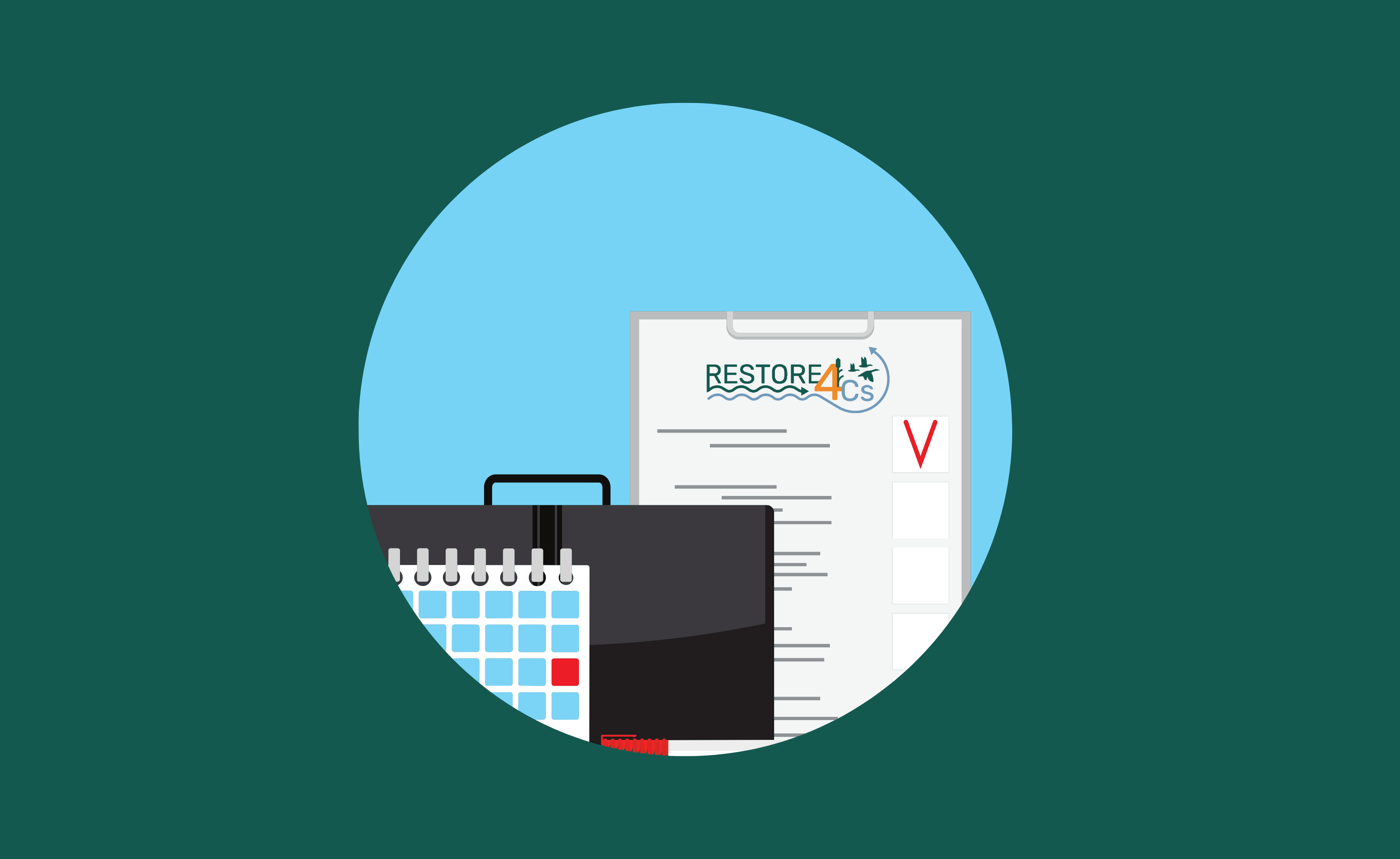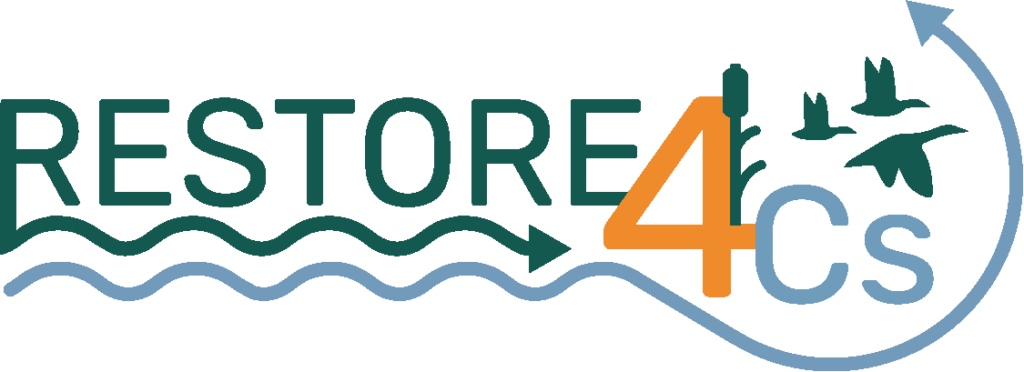A sound workplan has been put in place to ensure the implementation of RESTORE4Cs activities. Nine Work Packages (WPs) have been identified with realted deliverables and milestones. Please find below the interactive list of our WPs. Once a public deliverable will be published it’ll be available for download on this page driectly.

Work Packages
WP1 | Policy relevance
Duration: M1 – M36
Lead beneficiary: Ecologic
- Assess the extent to which EU and national policies help achieve or hinder wetland restoration and the delivery of key ecosystem services (e.g., carbon storage, biodiversity, disaster risk reduction).
- Identify the needs for data, information systems, methods and tools of decision-makers and practitioners working on the implementation of policies for wetland restoration and climate change mitigation/adaptation.
- Synthesise key policy-relevant project insights for decision-makers and practitioners.
- Develop guidance to assist national authorities and practitioners on the use of RESTORE4Cs methods and tools to address key policy targets.
Deliverables:
- Policy analysis and policy demands for data, methods, and tools (M18)
- Implementation roadmap (M34)
- 11 Policy synthesis briefs (M36)
Milestones:
- EU policy orientation / science-policy workshop (M8)
- Regional science-policy workshops (M12)
- Draft outline of implementation roadmap for decision-makers (M26)
WP2 | European (coastal) wetlands restoration Community of Practice (ECoP)
Duration: M1 – M36
Lead beneficiary: MedWet
- Structure an European Community of Practice (ECoP) by connecting institutions, policymakers, scientists and the general public about wetlands restoration to support the implementation of the new EU Nature Restoration Law of the EU BDS 2030 and to foster climate mitigation and adaptation solutions.
- Co-design a multi-actor approach for the project’s stakeholder interaction at the EU and local level.
- Increase the impact of existing cooperation on wetlands restoration and protection results by capitalising the results of other EU programmes (LIFE, H2020, ERDF etc) and by promoting co-operation, consultations and joint activities on cross-cutting issues and share of results with other relevant projects.
Deliverables:
- ECoP technical implementation & development roadmap (M12)
- Guides and recommendations for scaling up of the solutions (M18)
Milestones:
- ECoP in place (M17)
- ECoP online platform launched (M24)
WP3 | Integrative assessment framework and scenario development
Duration: M1 – M36
Lead beneficiary: CNR
- Review the knowledge and the tools that are already available to provide information on the state-of-theart of modelling, monitoring, mapping, restoration, and management of wetlands.
- Develop models, blending process-based and data-driven components, and made available as modules to be inserted in regional climate models. Boosting the integration of data sources and products to be assimilated in advanced models, in the spirit of a wetland ecosystem digital twin, to address landscapeecosystem
dynamics (WP4, WP5, WP6) and the provision of ecosystem services. - Provide a comprehensive framework to assess the pan-European wetland system dynamics, across scales (micro, meso, macro), under the combined effect of climate change and anthropic pressures either negative or positive (i.e. restoration, WP5).
Deliverables:
- Integrative assessment framework of the GHG abatement potential and resilience of wetlands - 1st version (M14)
- Modelling and mapping tools for WP4-6 (M28)
- Integrative assessment framework of the GHG abatement potential and resilience of wetlands - final version (M34)
Milestones:
- Climate and land use scenario (M21)
WP4 | Climate mitigation services and C and GHG processes in wetlands
Duration: M1 – M30
Lead beneficiary: University of Valencia
- Overcome data gaps by obtaining data sets on C-storage capacity and GHG emissions mitigation from well-preserved, altered (including several types of alterations, e.g., trophic, hydrological, morphological) and restored (mainly actions related to soils, hydrology and water quality, vegetation, and morphological reconstruction; including passive and active restoration) coastal wetlands.
- Obtain these data sets from Case pilots (in situ), plus additional wetland types, including floodplains and peatlands (from literature review), for the meta-analysis.
- Provide data to feed (calibration and validation) the response models to be elaborated in WP3 to assess the response of wetlands to changes in their ecological status as well as those caused (potentially improving) by restoration actions performed both in the wetlands themselves and in their catchments.
- Provide data to enable upscaling at WP6 and integration in the decision-making platform (WP7).
Deliverables:
- Case Pilots overview and context setting (M4)
- Methodological manual (M4)
- Guidance report for ISI papers content (M30)
Milestones:
- Case Pilots’ data sets ready (M3)
- Meta-analysis data sets (M17)
- Case Pilots’ data sets ready (M21)
WP5 | Social, ecologic, and economic valuation for enhanced co-benefits from wetland restoration
Duration: M1 – M30
Lead beneficiary: Vertigo Lab
- Assess and compare the effect of different wetland restoration actions on the C-storage capacity and the GHG exchange balances of wetlands.
- Test methods and information gathered on climate and other services across Case Pilots to inform the development of tools to be included in the upscaling and toolbox exercises.
- Provide evidence as to when and how wetlands restoration is good value for money.
- Assess the potential of existing financing tools to boost public and private investment in wetland restoration in Europe.
- Analyze the social acceptability of wetland restoration and management practices from the perspective of multiple alternative scenarios.
Deliverables:
- Key wetland restoration actions report (M25)
- Co-benefits and economic valuation of ecosystem services provided (M25)
- Cost/benefit analysis of wetland restoration options (M28)
- Synthesis on financing tools: wetlands restoration as nature-based solutions (M28)
- Social acceptability of wetland restoration and management (M28)
Milestones:
- Methodology for local stakeholders’ perceptions ready (M8)
- Inventory of sustainable financing options (WP18)
- Case Pilots’ data sets ready (M23)
WP6 | Upscaling and integration for assessment of the status and restoration potential of wetlands in Europe
Duration: M6 – M36
Lead beneficiary: University of Malaga
- Upscale the tools and methodologies developed under WP3, WP4 and WP5 to prepare the development of workable tools to estimate the restoration-mediated improvement of the climate change mitigation capacity and other ecosystem services of wetlands at broader scales and serve as input for the toolbox and platform developed by WP7.
- Integrate the knowledge developed in WPs 2, 4 and 5 together with existing EO-based information layers that indicate wetland condition and pressures to deliver comprehensive mapping and assessment tools for wetland ecosystems at European scale. This includes the assessment of the status of European wetlands and the potential wetland restoration assessment, with focus on GHG abatement and C-storage favouring the climate change mitigation service.
- Provide a conceptual generalization of the RESTORE4Cs approaches that support the application to other wetlands, such as floodplains and peatlands.
Deliverables:
- Methodological description of information layers (M24)
- Status assessment of European wetlands (M32)
- Guidelines on the conceptual generalization of the procedures (natural wetlands, floodplains and peatlands) (M32)
- Potential areas for wetlands restoration assessment, including datasets (M33)
- Catalogue of upscaling tools and methodologies (M36)
Milestones:
- Information layers and indicators (M12)
- Draft of status assessment methodology and table of contents (M16)
- Internal workshops on upscaling options (M18, 24)
- Draft guidelines on the conceptual generalization (M24)
- EU potential wetland restoration dataset (M26)
WP7 | Online Platform and Toolbox for decision making to support wetlands restoration actions
Duration: M1 – M36
Lead beneficiary: Tour du Valat
- Prepare a repository for all data and metadata of interest for the project, including all types of data produced at the scale of the Pilot Sites (WP3 and WP4) and those upscaled at national and pan-European levels (WP6), accounting for the FAIR principles.
- Design and implement an Online Platform that integrates the main results from WP3, WP4, WP5 and WP6 regarding wetlands monitoring, ecosystems condition assessment and restoration actions priorisation.
- Develop an Integrative Toolbox that could be used as the main project’s framework to provide guidance and recommendations, essentially derived from WP3, WP4, WP5 and WP6 outputs to support the decision-making assessments for wetland ecosystems restoration (prioritization of actions, choice of alternatives, economic efficiency analysis…). This Integrative Toolbox will also use a policy-centred approach focusing on user needs that incorporates stakeholder involvement throughout its development (links with WP1 and WP2).
Deliverables:
- RESTORE4Cs Interactive Online Platform (M34)
- Integrative and multi-scale Toolbox for wetland practitioners to support defining restoration priorities (M34)
- System Design Document - SDD (M36)
Milestones:
- System Design Document - Data-repository, online Platform and Toolbox (M20)
- Interactive Online Platform launched (M30)
- RESTORE4Cs Integrated Toolbox released (M30)
WP8 | Communication, dissemination, and exploitation
Duration: M1 – M36
Lead beneficiary: University of Salento, LifeWatch ERIC
- Ensure the visibility of the project and disseminate its outcomes to the identified target groups.
- Raise awareness of project and its outcomes towards the society at large.
- Support engagement of stakeholders and exploitation of project results.
- Guarantee the sustainability of the actions and outcomes of the project.
Deliverables:
- Dissemination & Communication Plan (M6)
- Video documentary series (M32)
- Exploitation and Sustainability Plan (M34)
Milestones:
- Release of the website & launch of the community space (M3)
- Launch of serious game competition (M23)
- Organisation of the first Summer School (M31)
WP9 | Management and Coordination
Duration: M1 – M36
Lead beneficiary: University of Aveiro
- Efficiently coordinate and manage all technical aspects, with respect to deadlines, objectives, and financial aspects of the project.
- Facilitate and manage communication flow and information exchange between the consortium partners, supported by the Steering Committee, as well as with the European Commission.
- Keep deadlines and ensure optimal implementation and integration, and high-quality progress reporting within the allocated budget.
- Provide guiding principles for data management in the project (FAIR principles, resources allocation, data security and ethical aspects)
Deliverables:
- Project Management Plan (M3)
- Data Management Plan, 1st version (M6)
- Data Management Plan, final version (M33)
Milestones:
- Advisory Board meetings outputs/recommendations (M6, 18, 30)
- Steering Committee meetings outputs (M7, 19, 31)
